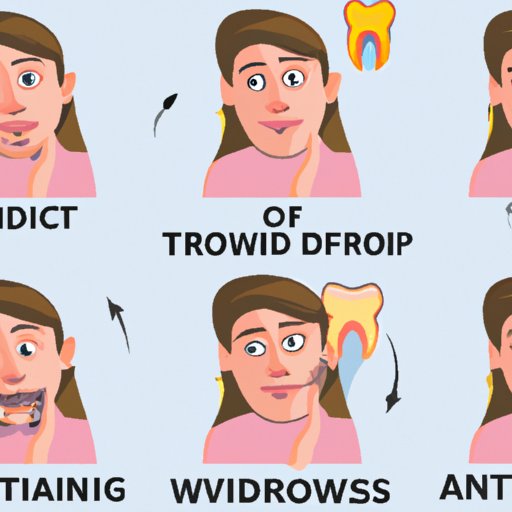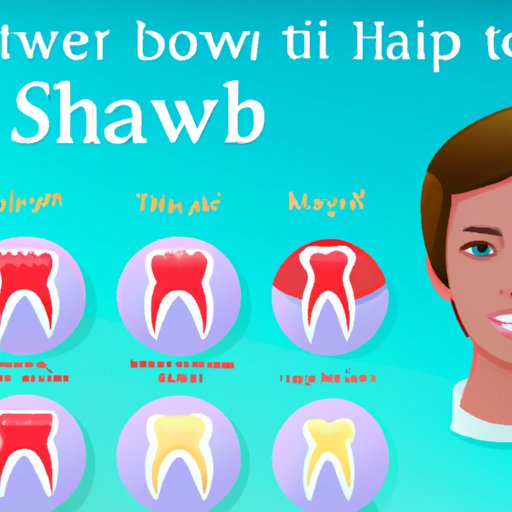Introduction
Having wisdom teeth removed is a common dental procedure. While the procedure itself is relatively straightforward, recovery can be uncomfortable and it can take some time before you’re able to eat normally again. In this article, we’ll explore the different stages of recovery after wisdom teeth removal and provide tips on how to eat comfortably while allowing your jaw to heal properly.

Exploring the Different Stages of Recovery After Wisdom Teeth Removal
Immediately following the procedure, you may experience some numbness in your mouth that can last for several hours. This is normal and is due to the use of local anesthesia during the procedure. You may also experience some minor bleeding and swelling. It’s important to keep the area clean to prevent infection, so your dentist will likely give you specific instructions on how to care for the area.
The next few days can be uncomfortable as the pain and swelling increase. According to a study published in the Journal of Oral and Maxillofacial Surgery, “Most patients reported peak pain levels within 48–72 hours post-surgery.” However, within a week or two, you should start to notice a gradual decrease in pain and swelling.
A Guide to Eating and Drinking After Wisdom Teeth Removal
Your dentist will likely recommend that you stick to soft foods and liquids for the first 24 hours after the procedure. This includes things like soup, yogurt, smoothies, applesauce, pudding, and milkshakes. As you start to feel better, you can gradually move to solid foods as tolerated. Avoid hard or chewy foods for at least several weeks as these can irritate the area and delay healing.

What to Expect in Terms of Eating Habits After Wisdom Teeth Removal
Following the procedure, it’s important to make sure that you’re getting adequate nutrition. You may find that you have an increased need for protein and fluids. You should also avoid hot or cold foods as these can cause discomfort. Additionally, try to take smaller bites and chew slowly and carefully.
Tips for Eating Comfortably After Wisdom Teeth Removal
In order to help your jaw heal properly, it’s important to take measures to reduce swelling and discomfort. Applying ice packs to the area can help to reduce swelling and discomfort. You can also use an oral anesthetic spray or gel to numb the area before eating. Additionally, try to avoid opening your mouth too wide when eating.
Making Sure You’re Eating Nutritious Foods After Wisdom Teeth Removal
It’s important to make sure that you’re getting enough nutritious foods in your diet following your procedure. Try to focus on a balanced diet with plenty of fruits and vegetables, healthy proteins such as lean meats, fish, nuts, and beans, and plenty of fluids to stay hydrated. Also, try to avoid sugary snacks and processed foods as much as possible.

How to Help Your Jaw Heal After Wisdom Teeth Removal
In addition to eating nutritious foods, there are certain lifestyle habits you can adopt to help your jaw heal properly. Practice good oral hygiene by brushing and flossing regularly. Also, avoid smoking and drinking alcohol as these can slow down the healing process. Finally, make sure to get plenty of rest to help your body heal.
Understanding the Time Frame for Normal Eating After Wisdom Teeth Removal
Generally, it takes about 2-3 weeks for the area to heal completely and for you to be able to eat normally. However, this can vary depending on the individual and the type of procedure performed. If you’re still experiencing pain or swelling after 3 weeks, contact your dentist to make sure that everything is healing properly.
Conclusion
Having wisdom teeth removed can be a daunting process, but with proper care and attention, you can ensure a speedy recovery. Taking the time to understand the different stages of recovery and the best ways to care for yourself during this time can help to make the process go more smoothly. With the right approach, you should be able to return to normal eating habits within 2-3 weeks.
(Note: Is this article not meeting your expectations? Do you have knowledge or insights to share? Unlock new opportunities and expand your reach by joining our authors team. Click Registration to join us and share your expertise with our readers.)
